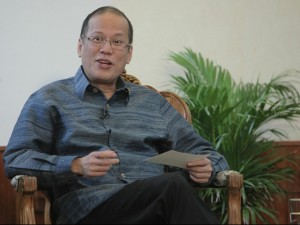No one-on-one meetings for Aquino at Asean summit
MANILA, Philippines—President Benigno Aquino III is not scheduled for now to meet one-on-one with US President Barack Obama or any other head of state at the summit of Southeast Asian leaders in Cambodia on Nov. 18-20, an official of the Department of Foreign Affairs said Wednesday.
“So far no bilateral meetings have been scheduled for this trip to Phnom Penh,” DFA spokesperson Raul Hernandez said.
But he did not discount the possibility that one-on-one talks could be arranged between the two leaders on the sidelines of the 21st Association of Southeast Asian Nations (Asean) Summit and related meetings with Asean partners hosted by Cambodia.
In a pre-departure media briefing at Malacañang, Hernandez said Obama’s presence at the Asean meeting could give a boost to the country’s advocacy for regional unity in resolving disputes with China in spite of perceived rifts within the Asean bloc.
“Well, his meeting there—being one of the dialogue partners—would enhance the relationship between the US and Asean and I think the focus is really on Asean and its relationship with the United States.
Article continues after this advertisement“And, therefore, whatever help the dialogue partners—including the US—(can give) in trying to pursue a peaceful settlement of issues in the West Philippine Sea, in accordance with the international law particularly the UN Convention on the Law of the Sea, would be a great help to our advocacy,” he said.
Article continues after this advertisementAquino, who will fly to the Cambodian capital on Saturday, is expected to raise a number of concerns, chief among them the drafting of a binding Code of Conduct (COC) that will guide negotiations between claimants to islands on the West Philippine Sea, or the South China Sea.
“What we expect to happen is that we will be able to convince China to commit to the starting of the negotiation on the COC for the good and stability and the peace in the region,” Hernandez said.
He noted that China has indicated its intent to begin negotiations as soon as it felt the time was right.
“But the Asean is already ready with the elements of the COC and we are ready to negotiate with China. So we hope that China would respond positively and immediately tackle this issue so that we can have something binding for our issue on the West Philippine Sea,” Hernandez said.
He said it was important to underscore “Asean centrality” in the negotiation.
“For Asean, it has always been the position that any initiatives should first be accepted and approved by the Asean, and only then would it be presented to other dialogue partners,” Hernandez said.
The President will also push for maritime security and cooperation, migrant workers’ protection and welfare, human rights, and a review of the Asean charter, including a proposal to limit the Asean Summit to only once a year, Hernandez said.
A highlight of the summit will be the official launch of the Asean Institute for Peace and Reconciliation, an initiative of Indonesia aimed at reviewing regional cooperation, and contributing to the peace and reconciliation in the region, Hernandez said.
The President will also participate in the signing by Asean leaders of the Phnom Penh statement on the adoption of the Asean Human Rights Declaration.
The theme for the Asean summit is “Asean: One Community, One Destiny.” This year marks the 45th year of Asean, which groups the Philippines, Cambodia, Singapore, Indonesia, Malaysia, Brunei, Thailand, Burma (Myanmar), Laos, and Vietnam.
Along with China and Taiwan, Asean members Brunei, Malaysia, the Philippines and Vietnam have overlapping claims in the West Philippine Sea, sparking near-confrontations, including a months-long standoff between China and the Philippines over the Scarborough (Panatag) Shoal west of Zambales.
The Asean leaders will also have a series of discussions with major allies about regional and international issues on Nov. 19, including the 4th Asean-US Leaders Meeting with Obama.
The last meeting, on Nov. 20, will be the 7th East Asia Summit among the 10 Asean leaders with eight partners namely Australia, China, India, Japan, New Zealand, South Korea, the United States, and Russia.
